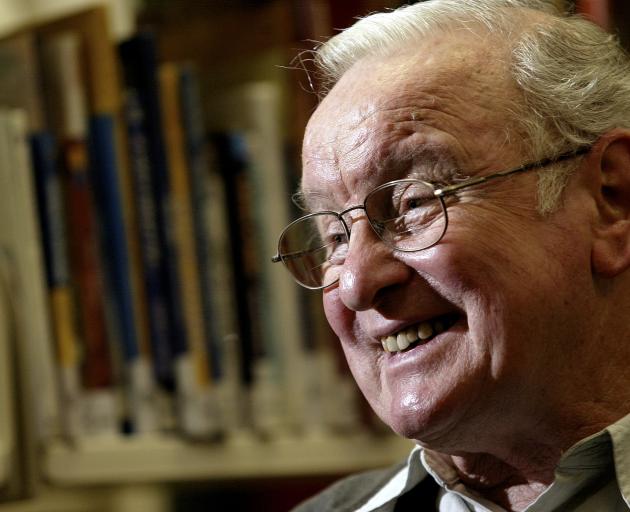Lifestyle
Celebrated Author Maurice Gee Passes Away at 93, Leaving Legacy

Maurice Gee, a prominent figure in New Zealand literature, passed away on June 12, 2023, at the age of 93. Renowned for his captivating narratives that explored the complexities of ordinary lives, Gee’s work earned him numerous accolades over more than five decades. His books, appealing to both children and adults, often featured themes of reflection on past events that shaped his characters’ experiences.
Born in Whakatāne in 1931, Gee was the middle child among three sons of Harriet Lyndahl Gee and carpenter Leonard Gee. His mother, a writer herself, published a children’s picture book, fostering an early appreciation for storytelling in her son. Gee’s grandfather, the controversial minister James Chapple, inspired his most famous character, George Plumb. Growing up in the rural Auckland suburb of Henderson, many of Gee’s stories were rooted in this familiar backdrop.
Gee attended Avondale College and later graduated with a Master’s degree in English from Auckland University. Despite early publications in magazines, he faced challenges in establishing a career as a full-time author in New Zealand. After a brief teaching stint, he resigned in 1956 to devote himself entirely to writing. Financial support from the New Zealand Literary Fund in 1960 and 1961 aided his early career, leading to the publication of his debut novel, The Big Season, in 1962. This unique blend of rugby and crime garnered positive reviews and helped him secure the Robert Burns Fellowship at the University of Otago in 1964.
During this fellowship, Gee penned his second novel, A Special Flower, before transitioning to a career as a librarian, a role he held for several years. In 1970, he married Margareta, whom he had met at the Alexander Turnbull Library. They welcomed two daughters together, alongside Gee’s son from a previous relationship.
His third novel, In My Father’s Den, published in 1972, remains one of his most celebrated works. It was adapted into a successful film in 2004, further cementing its place in New Zealand’s literary canon. The following year, his collection of short stories, A Glorious Morning, Comrade, earned him his first major award, the fiction prize at the 1976 New Zealand Book Awards.
By the late 1970s, Gee was recognized as a leading voice in New Zealand literature. In 1978, he published Plumb, a trilogy that drew on his ancestral roots, winning the prestigious James Tait Black Memorial Prize for fiction in 1979. He expressed a unique perspective on his works, stating, “I can’t look at my books the way I read other books. I look at them quite differently.”
The year after, he released Under the Mountain, a beloved children’s book featuring an eerie storyline about aliens beneath Auckland’s volcanos. This work not only captivated young readers but also became a popular television series, stage play, and feature film. In 2004, it received the Gaelyn Gordon Award, recognizing its lasting impact.
Gee continued to engage with children’s literature, producing notable works such as The Halfmen of O, which won Children’s Book of the Year. His relationship with Victoria University flourished during the late 1980s, culminating in an honorary doctorate of literature in 1987 and a writing fellowship in 1989. Three years later, he was awarded the Katherine Mansfield Menton Fellowship, during which he wrote Crime Story, a critique of the policies of the Lange Labour Government in the 1980s. This work was later adapted into the film Fracture.
In 1993, he published Going West, a highly autobiographical novel that contributed to the name of a long-running literary festival in West Auckland. The book also earned him another New Zealand Book Award. His children’s novel, The Fat Man, and the adult novel Live Bodies further solidified his reputation, with the latter winning the Deutz Medal at the Montana New Zealand Book Awards in 1998.
Starting in 2003, Gee received numerous accolades reflecting his remarkable contributions to literature. He was honored as an Arts Foundation “Icon,” and in 2004, he received the Prime Minister’s Award for Literary Achievement in fiction. Subsequent novels, including Blindsight and Salt, continued to gain recognition. In 2015, a biography by Rachel Barrowman highlighted his life, which Gee described as “illuminating even for me.”
Three years later, he published his own memoir, Memory Pieces, which was shortlisted for the non-fiction prize at the 2019 Book Awards. In 2020, Gee and Margareta relocated to Nelson as he stepped back from writing.
Maurice Gee’s enduring legacy as a storyteller will be remembered, as his contributions to New Zealand literature continue to resonate with readers across generations.
-

 World4 months ago
World4 months agoTest Your Knowledge: Take the Herald’s Afternoon Quiz Today
-

 Sports4 months ago
Sports4 months agoPM Faces Backlash from Fans During Netball Trophy Ceremony
-

 Lifestyle4 months ago
Lifestyle4 months agoDunedin Designers Win Top Award at Hokonui Fashion Event
-

 Entertainment4 months ago
Entertainment4 months agoExperience the Excitement of ‘Chief of War’ in Oʻahu
-

 Sports4 months ago
Sports4 months agoLiam Lawson Launches New Era for Racing Bulls with Strong Start
-

 World5 months ago
World5 months agoCoalition Forms to Preserve Māori Wards in Hawke’s Bay
-

 Health4 months ago
Health4 months agoWalking Faster Offers Major Health Benefits for Older Adults
-

 Lifestyle4 months ago
Lifestyle4 months agoDisney Fan Reveals Dress Code Tips for Park Visitors
-

 Politics4 months ago
Politics4 months agoScots Rally with Humor and Music to Protest Trump’s Visit
-

 Top Stories5 months ago
Top Stories5 months agoUK and India Finalize Trade Deal to Boost Economic Ties
-

 Health2 months ago
Health2 months agoRadio Host Jay-Jay Feeney’s Partner Secures Visa to Stay in NZ
-

 World5 months ago
World5 months agoHuntly Begins Water Pipe Flushing to Resolve Brown Water Issue









